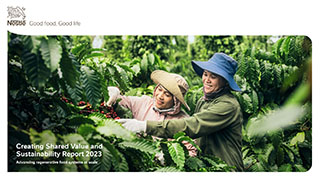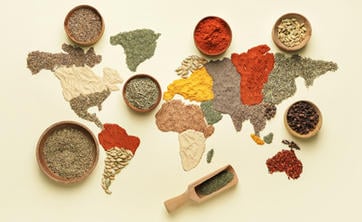Our approach to supporting balanced and sustainable diets

Food and good nutrition are fundamental to everyone’s health, well-being and quality of life, as well as their cultural identity.
Food nourishes the body and is also a source of enjoyment, playing an important part in our social lives and culture. All food can be part of a balanced diet if consumed in an adequate amount and as part of an active lifestyle.
Transparency on our portfolio
It is important for us to provide people with transparent nutrition information to make informed food choices for a balanced diet. We want to provide people with the information they need to understand the nutritional value of our very broad product portfolio.
Last year, we were the first company to publish the nutritional value of our entire global portfolio of foods and beverages using the Health Star Rating system. This is a nutrient profiling system used on front-of-pack nutrition labels in some countries and applied by the Access to Nutrition Initiative (ATNI)1.
Read more about transparency on our portfolio.

Our nutrition strategy
With our global presence, extensive portfolio as well as research and development capabilities, we are well placed to deliver on our ambition to bring tasty and balanced diets within the reach of billions of people for today and for generations to come.
To bring this to life, our nutrition approach has two pillars: 'Portfolio and products' and 'Communication and services'. To help us deliver on our ambition we have set two priorities: grow the more nutritious part of our portfolio and guide consumers towards balanced consumption.
Offering more nutritious food
Our priority is to grow our portfolio segments with a Health Star Rating (HSR) ≥ 3.5 and specialized nutrition products. We have set a new and ambitious target to grow the sales of more nutritious products by CHF 20-25 billion by 2030, representing about 50% growth over 2022 sales.2
We will deliver on our priority through three main actions:
- Continue to invest in R&D to innovate and renovate our products including through micronutrient fortification
- Expand our nutritious product offerings including our affordable nutrition range, plant-based foods as well as products for children and healthy ageing
- Allocate significant marketing spend to these two segments
Overall, we will continue our efforts to improve the nutritional value of our products, adding ingredients such as whole grains, which provide essential nutrients, and continue to reduce sugar, salt and fat.
In 2022, we improved the Health Star Rating of 1200 products. Over the last six years (2017-2023), we have achieved 5-6% sugar and salt reduction, offering lower-sugar and lower-salt versions of our more iconic products. We also introduced new proprietary technologies to reduce sugar and fat in products.
Read more about our plant-based product portfolio.
Providing nutrition information and marketing responsibly
Our second priority is to guide people towards balanced consumption. We provide information and services to help people make informed food choices as part of a balanced diet. These range from clear nutrition labelling to stringent responsible marketing practices, such as voluntarily restricting marketing of certain products to children under the age of 16, as well as nutrition education programs and services that promote healthy lifestyles, including initiatives like Nestlé for Healthier Kids.
To support this, we have strengthened our responsible marketing of indulgent products. Specifically, we have set two new commitments for our confectionery and ice cream products, where local regulations allow:
- All our children’s portions will be 110 kcal or less
- All our multi-serve products will have clear front-of-pack guidance

To complement our actions, we continue to look for ways to provide easy-to-understand and meaningful nutrition value and portion guidance to consumers, assisting them with menu planning and providing tools to evaluate the nutritional value of consumers’ meals, such as MyMenu Plan and MyMenu IQ™.
Read more about Nestlé for Healthier Kids.
Making nutrition accessible and affordable
Consumers worldwide, regardless of their backgrounds, strive to eat a balanced diet. However, various life challenges get in their way. Affordability and accessibility often stand as barriers, preventing individuals from consuming the diet they desire. Additionally, time constraints for cooking or shopping can pose further obstacles.
Currently, 3 billion people cannot afford a healthy diet worldwide. To help consumers, we will further expand our affordable and nutritious offerings. We also provide in countries with the highest risk of deficiencies a range of regularly consumed products fortified with essential micronutrients, such as iron, zinc, vitamin A and iodine, that may be lacking in many people’s diets.
Read more about affordable nutrition.

Our contribution to building nutrition knowledge
We regularly share our research on nutrition with the scientific community.
We host and participate in scientific conferences, presenting nutrition research and engaging in scientific dialogue with the scientific and healthcare professional community.
To provide access to a large data set of nutrition and health indicators, we have partnered with the Friedman School of Nutrition Science and Policy at Tufts University to create the Global Nutrition and Health Atlas.
- Access to Nutrition Initiative (ATNI)
- The target assumes constant foreign exchange rates. Should any material acquisitions or divestitures take place, the target may be adjusted accordingly.
As a parent and grandparent, nothing gives me greater pleasure than sharing a delicious meal with my family. At Nestlé, we constantly ask ourselves how we can support more people to enjoy tasty and balanced diets. Our new nutrition strategy Good for You is going to help answer that question.









